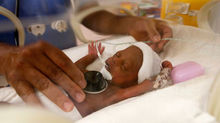Why fasting and prayer are especially meaningful at Easter and during a pandemic
- Apr 10, 2020
- 1 min read

Christians of different faiths will fast on Good Friday. The actual fast may look different. But most have similar beliefs about the spiritual significance of skipping meals.
Timothy O’Malley won’t go to his office or church or a friend’s house this Friday, just as he hasn’t any other day this week. But, unlike on other days, he also won’t eat more than a simple cup of soup.
The first set of sacrifices stem from social distancing requirements, which aim to slow the spread of COVID-19. His meal plan, however, is inspired by his faith. Nearly all Catholics fast on the last Friday before Easter.
“It’s all part of our worship of God,” said O’Malley, who serves as director of education at the University of Notre Dame’s McGrath Institute for Church Life.
This year, Catholics won’t be the only people of faith skipping meals on Good Friday. President Russell M. Nelson of The Church of Jesus Christ of Latter-day Saints has asked members of his church to spend the day fasting and praying for relief from the coronavirus, and invited nonmembers to do the same.
“I invite all, including those not of our faith, to fast and pray on Good Friday … that the present pandemic may be controlled, caregivers protected, the economy strengthened and life normalized,” he said on April 4. “Let us unite in pleading for healing throughout the world.”
The Rev. Walter Kim, president of the National Association of Evangelicals, issued a similar call Wednesday to people of faith across the country.
“On Good Friday, let’s … pray and fast throughout the nation,” he said.







































Comments